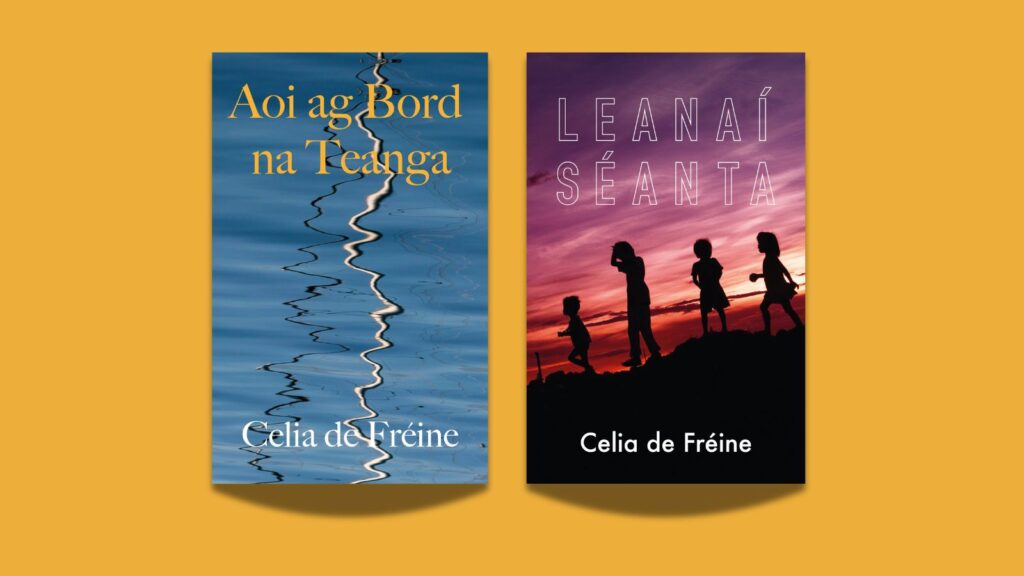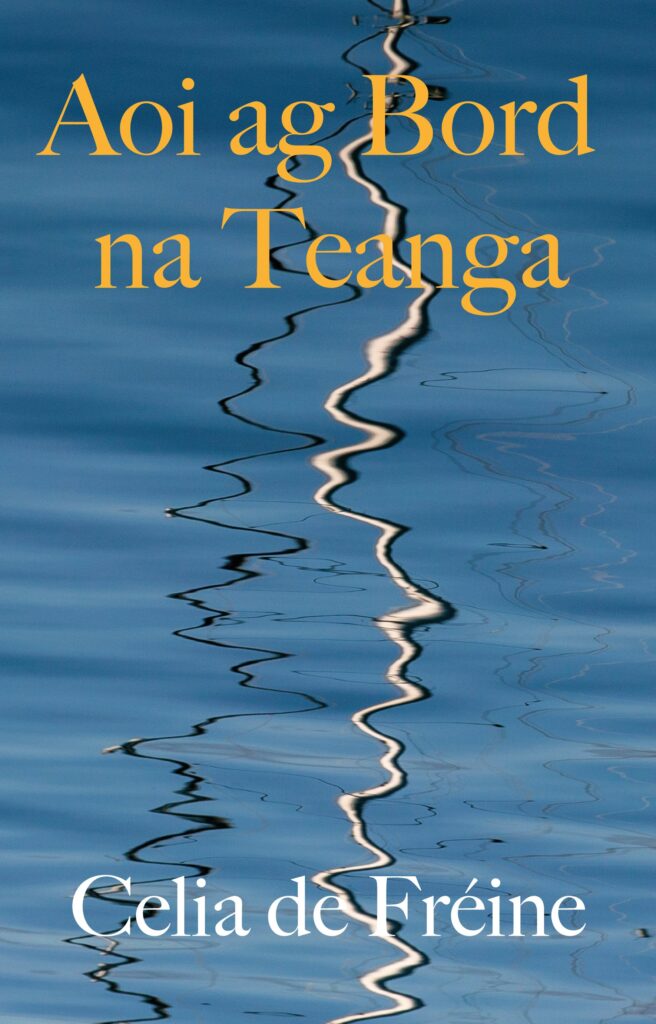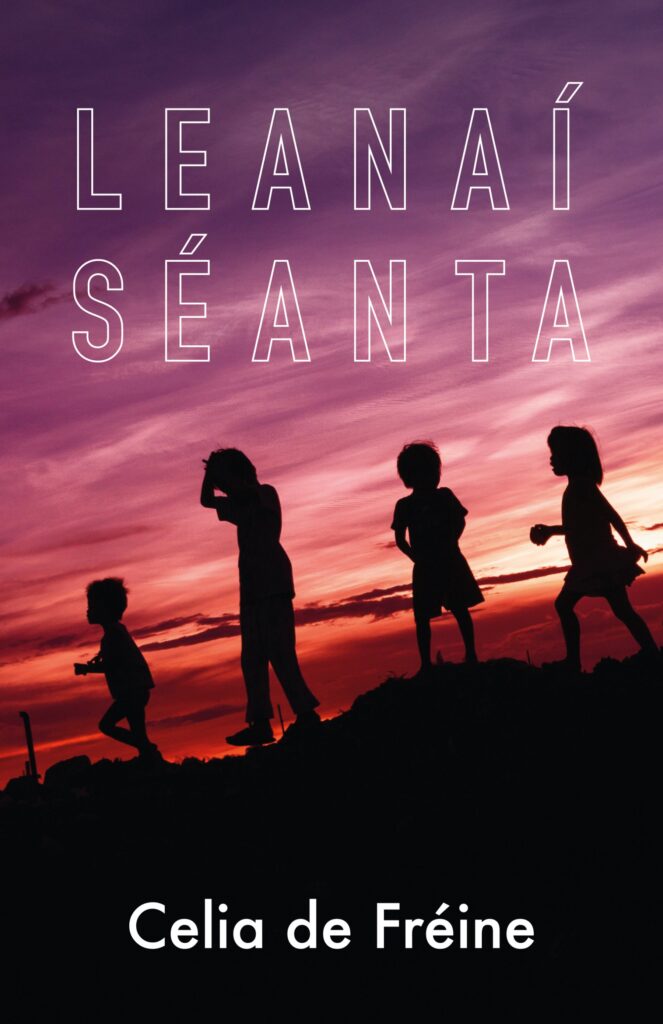
Aoi ag Bord na Teanga|Celia de Fréine|LeabhairCOMHAR|Leanaí Séanta|Celia de Fréine|LeabhairCOMHAR
Celia de Fréine tells readers she found the password to the Irish language in her soul
Books of selected poems give readers a great chance to consider the work of a writer over a number of individual collections and occasional publications. They may act as an introduction or a catch up for those who have yet to read the poet recently, or at all. Apart from anything else they tend to be better value than buying each collection separately. Readers will miss out on work not included from individual collections but gain by having selected the poet or editor’s choice of their best work.
So it is a delight to finally get around to Celia de Fréine‘s Aoi ag Bord na Teanga, published towards the end of 2022. She is an inveterate and energetic writer who has written poetry, stage plays, television drama, fiction and non-fiction, mostly for adults but also for younger readers. In this selection we have poems from several collections published over the past twenty three years, as well as a number of poems published here for the first time. There is also an excellent introduction by the critic Rióna Ní Fhrighil.
Ní Fhrighil points out that each individual collection has a central theme or topic, and that there’s continuity in the form of the individual poems in each collection, while her general style is pared back and unadorned. Overall her subject matter often comes from injustices she witnesses happening at home and abroad.
Fiacha Fola is an outraged reaction to the Hepititis C scandal twenty years ago and the mistreatment of women who had contracted the disease through contaminated blood transfusions. The injustice was exacerbated by the medical establishment and government’s reaction to it— that literally added insult to injury.

Throughout she is a thoughtful and careful writer who keeps her poetic balance while describing the unjust and uncertain world that she witnesses
As with much of her literary work there are strong feminist elements in de Fréine’s writing, whether realistic or surrealistic. Psychological and physical suffering, personal and political suppression, injustice in its many and varied forms are constant and recurring themes. The visual arts and literature are themes which regularly appear in her work, whether that be echoes of the poetry of Nuala Ní Dhomhnaill, Marina Tsevtaeve or Rainer Maria Rilke, the painting of Frida Kahlo or the many references to world literature, traditions and history such as the Lady and the Unicorn tapestry, stories from the Bible or the ignored importance of Albert Einstein‘s first wife.
Celia de Fréine’s influences are as international as they are Irish, with ancient literature and current affairs appearing side by side. Her poems and references take us to Paris, Slovenia, Turkey, New England and Sardinia. Throughout she is a thoughtful and careful writer who keeps her poetic balance while describing the unjust and uncertain world that she witnesses.
Psychological and physical suffering, personal and political suppression, injustice in its many and varied forms are constant and recurring themes
Irish was not her first language and de Fréine is conscious of that fact and addresses it. Indeed the name of this collection means ‘A Guest at the Language’s Table’ and there is a poem with that title where she recognises herself as being outside the community of native speakers and their folklore, and also outside the academic world of language experts.
Celia de Fréine tells readers she found the password to the language in her soul, and if she was once unsure as to which knife to use at the linguistic table, she was always welcome and became an honoured guest—and rightly so.
Aoi ag Bord na Teanga is an excellent introduction to Celia de Fréine’s work and is attractively produced with several apposite colour photographs by Simon Robinson.

Published at the end of 2023 is Leanaí Séanta, the second collection of plays by Celia de Fréine. Prompted by real life incidents in the lives of women, the playwright creates memorable characters and credible plots, from facts and fiction, to give each story dramatic form.
The scandals of the Magdalene Laundries, the spin off from the Kerry Babies case, the X-case and the Y-case all feed into the two-handers Rogha Róisín and Cathú, while the two act multi-character Slán took initial inspiration from Mairéad Ní Ghráda‘s An Triail and the true story of a young woman who went missing fifty years ago.
Once again Celia de Fréine shows that there are scripts and scriptwriters capable of addressing important and contemporary stories in Irish
Once again Celia de Fréine shows that there are scripts and scriptwriters capable of addressing important and contemporary stories in Irish. The continuing neglect of Irish language theatre probably means that you will only have access to Celia de Fréine’s dramatic imagination through reading the stage plays in this slim volume rather than seeing a professional theatre production. The author and publisher are to be congratulated for making these scripts available.

Cathal Póirtéir has specialised in researching, presenting and commissioning Irish interest material in various radio formats and in books, including history, literature and folklore in Irish and English, as well as current affairs and drama.











